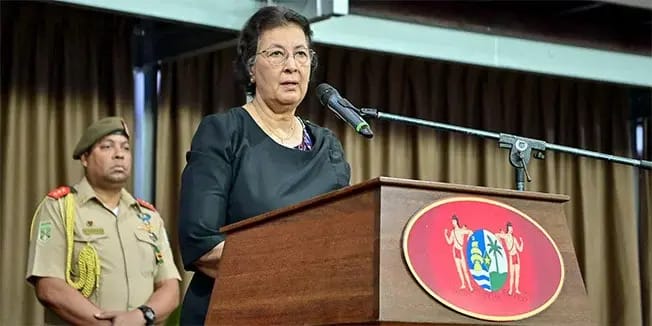- De Brief
- Posts
- A fraud scandal engulfs the government as the government considers the budget deficit.
A fraud scandal engulfs the government as the government considers the budget deficit.
The country reacts to a massive budget deficit being dragged down by wages, a fraud scandal that is overwhelming the government, and the government addressing the problems in the aviation sector.
Happy Monday!
This week, we focus on the budget deficit of the country being dragged down by wages, reform of the aviation sector, and a fraud scandal of government vehicles being sold for much cheaper than their asset prices.
25% of Suriname’s SRD67.17 billion (USD$1.64 billion) national budget is taken up by wages.

In 2025, over 25% of Suriname’s national budget (more than SRD 67.17 billion) will go to personnel costs (wages), totaling about SRD 16.74 billion. The Ministry of Education, Science & Culture will take the largest share of this, with SRD 3.88 billion allocated to its wage costs.
Relative to the country’s GDP, the deficit also grew significantly: from 1.7% of GDP (as of October 2024) to 6.1%. This steep rise is primarily due to increased government personnel costs.
The remaining expenses are non-personnel expenses (non-wages), like office supplies, utilities, and travel, and make up the remaining SRD 50.43 billion.
The government also inherited nearly SRD 7 billion in unpaid recurring expenses from the previous Santokhi administration, and the Ministry of Finance is investigating their legitimacy.
Without Parliament’s approval of the 2025 budget, which will start being debated on Tuesday, the government cannot pay salaries in August.
This is because legal spending can only happen under an approved budget. The current 2025 budget proposal exceeds its original spending ceiling, especially due to rising personnel costs. The 2024 budget is still legally in effect until the 2025 one is passed.
The rising wage bill contributes to a projected budget deficit of over SRD 11.5 billion, which remains concerning for the government.
Suriname’s aviation sector needs reform, and Suriname approved a loan from the Inter-American Development Bank to do so.

The Surinamese government has decided to proceed with the implementation of a previously approved USD 25 million loan from the Inter-American Development Bank (IDB). The goal is to improve safety, regulation, and reliability in the aviation sector, aligning with international standards and supporting economic growth.
The loan was made available at the end of 2024, but had not yet been used. A recent meeting between President Jennifer Simons and an IDB delegation confirmed the government's intent to move forward quickly. Modernizing aviation is considered a top priority, both for international compliance and future economic development.
The program will be comprehensive and is already in the final preparation phase. The focus areas are updating aviation laws, strengthening the aviation authority (CASAS), purchasing or repairing essential navigation equipment, and hiring international experts.
Collaboration will involve the European Union and the International Civil Aviation Organization (ICAO).
The government views this programme as vital for meeting global aviation safety standards. And it is a strategic investment to drive national economic growth.
Rabin Parmessar, parliamentary leader of the NDP, has been engulfed in a fraud scandal concerning the previous sales of government vehicles.

The recent sale of 20 government vehicles to officials at just 25% of their appraised value is only the tip of the iceberg. Minister Stephen Tsang (Public Works & Spatial Planning) claims there is widespread abuse involving hundreds of state vehicles, despite earlier promises to end such practices.
20 government cars were sold to officials at a quarter of their appraised value, despite a law aimed at banning such sales. Two luxury vehicles, originally worth over USD 100,000, were sold for only USD 10,000 each. Others went for as little as USD 3,000.
The Minister of Stephen Tsang (Public Works & Spatial Planning) is currently conducting a fleet inventory, amid strong suspicions of structural misuse involving hundreds of vehicles.
Parmessar argues that the law intended to prohibit vehicle transfers should have been implemented immediately, not delayed until a future government term.
While the current administration increased the resale rate from 10% (under NDP) to 25%, Parmessar calls this still a “disguised gift”, especially since vehicle valuations were allegedly kept deliberately low.
The two most expensive vehicles were purchased by former ministers Amar Ramadhin (Health) and Silvano Tjong-Ahin (Spatial Planning & Environment). While Marie Levens, former Minister of Education, also bought her vehicle.
All three were no longer part of the government after the NPS party left the coalition, yet were still allowed to purchase their service cars in the previous administration.
Parmessar claims this was a “convenient law” meant to create an illusion of ethical governance, while repeating the same practices the current administration once criticized the NDP for.
He criticizes the continued sale of vehicles amid Suriname’s strained national budget, noting that new cars now have to be bought for incoming ministers, which he calls “a complete waste”.
There are still government vehicles in the possession of some officials that have not been returned.
Suriname recognises the recognition of Indigenous peoples and the protection of Indigenous lands.

On Saturday, during celebrations in the Palmentuin and Independence Square, President Jennifer Simons made two major commitments: 1. Official Recognition of Indigenous Peoples: The government will formally recognize Indigenous communities as the original inhabitants of Suriname.
2. Protection of Indigenous Land: A new law will be enacted to stop the issuance of land concessions (e.g., for mining or logging) in Indigenous living areas.
Simons referred to the violent land disputes in Pikin Saron and Powakka, where two people were killed, hostages were taken, and assets were burned.
Indigenous men were sentenced to eight years in prison, and investigations into the involved police officers are still ongoing.
Simons stated, “If this law had existed, those events wouldn't have happened.”
She urged people not to be manipulated by hidden interests and emphasized that, once the law is in place, the government can move forward with land rights for Indigenous communities.